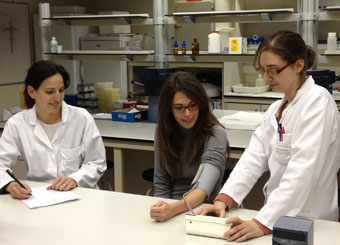
The Department of Preventive Medicine and Dentistry of the University of Medicine has developed follow-up studies of the Mediterranean diet in the University of Valencia and the results show that students tend to abandon healthy eating habits. Moreover, adherence to the Mediterranean diet, as measured by a validated scale, is inferior in students in during the first courses. This progressive abandonment of the Mediterranean diet is also detected in teachers and administrative and services staff, and at the same time it reflects the trend in the Spanish general population.
This propensity is very worrying given PREDIMED findings, which were published this week in the prestigious New England Journal of Medicine, which showed that the Mediterranean diet protects against cardiovascular disease and can reduce by 30% the risk of myocardial infarction, stroke or cardiovascular death. PREDIMED has counted on a very prominent researchers in the Department of Preventive Medicine, led by Dolors Corella, and from the Department of Biochemistry, both from the University of Medicine and Dentistry.
Under the Sustainable Campus of the University of Valencia and the Spanish Network of Healthy Universities (Reus), "we are developing several initiatives to analyze the level of adherence to the Mediterranean diet of both the university community and the general public" explains Professor of Preventive Medicine Dolors Corella, who believes we should work to encourage a return to healthier eating habits. The cross-sectional study of 682 university students (471 women and 211 men) from various courses at the University of Valencia, in which the researcher Patricia Guillem participated, showed a low adherence to the Mediterranean diet among students-an average of 8 points in a scale of 14."We detected a low consumption of fruit, vegetables and nuts, along with an excess in red meat and bakery products," said Corella, stressing that the least that followed the Mediterranean diet was found in younger students with significant differences.
Moreover, the study with 847 employees of the University of Valencia, where the Prevention Service and Environment participated, led by Professor Marius Fuentes, also showed not very high adherence to the Mediterranean diet (an average of 9 points on 14) between teachers and administrative staff and services. Furthermore, in this work it was found that increased monitoring of the Mediterranean diet was associated with better health status.
AN EIGHT MILLION INVESTMENT
The Mediterranean diet supplemented with extra virgin olive oil or nuts, may reduce the incidence of cardiovascular disease, according to the conclusions of PREDIMED, the largest randomized clinical trial conducted in Spain and one of the leading worldwide, funded by the Carlos III Health Institute and other institutions among which is the University of Valencia and the Generalitat Valencia. The total cost of the initiative reaches eight million euros. For 10 years we have collected data from nearly 7,500 people from all over Spain and the Faculty of Medicine and Dentistry was the entity with the highest level of recruitment of all institutions, since 1094 participants have gotten involved. Teachers behind this work are Dolors Corella, from the Department of Preventive Medicine, and Guillermo Sáez, from the Department of Biochemistry.
Publication of PREDIMED (Prevention Mediterranean diet) in the best medical journal in the world, New England Journal of Medicine, has had a major international impact and has been front page news in most of the widespread newspapers in the United States. Its significance is that it can change the recommendations the American Heart Association had made so far on the best diet for the prevention of cardiovascular diseases. Thus, it would recommend, instead a low-fat diet, a Mediterranean diet where olive oil and nuts, and a high intake of fruits and vegetables, fish and cereals, may play a crucial role.
Consequently, "the progressive abandonment of the Mediterranean diet in the Spanish population, especially younger ones, is highly disturbing and therefore regain tracking of university students is a priority to Healthy Campus of our university, promoted by vice-principal office of Sostenibilitat, Campus i Planificació" concludes Corella.
Estruch R, Ros E, Salas-Salvado J, Covas MI, Corella D, et al. Primary Prevention of Cardiovascular Disease with a Mediterranean Diet. N Engl J Med 2013 Feb 25.
Last update: 1 de march de 2013 08:08.
News release



















